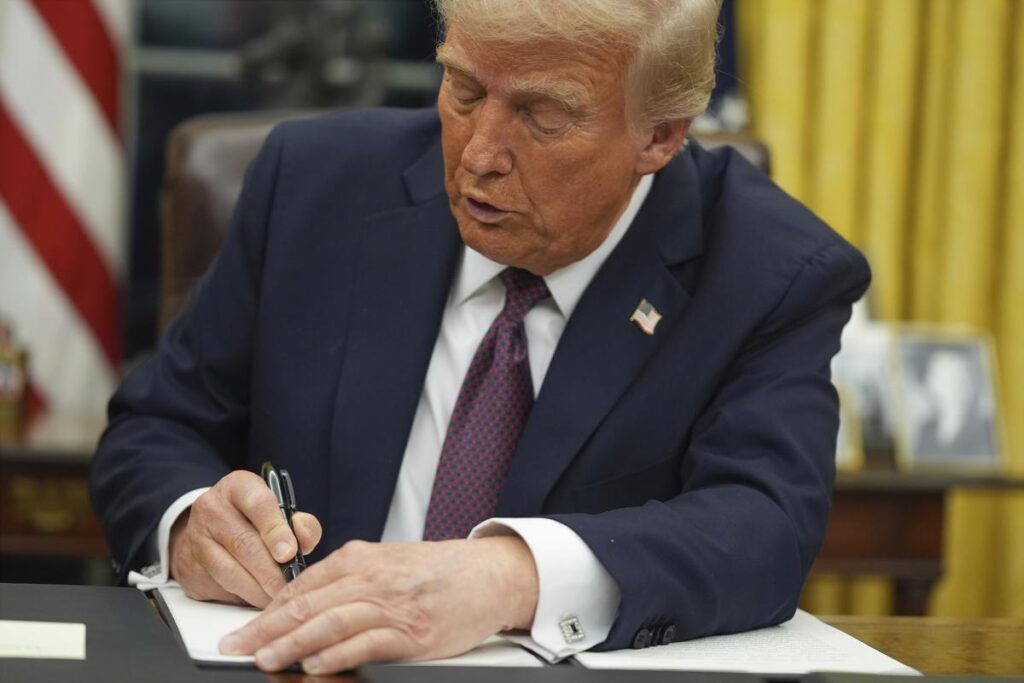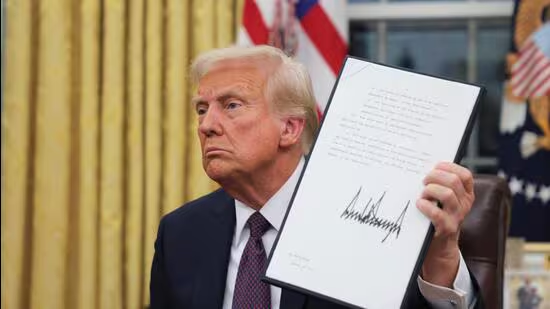U.S. President Donald Trump has taken a controversial step by signing an executive order to end birthright citizenship. This decision, announced immediately after his inauguration, has ignited fierce legal and political debates, as it directly challenges the 14th Amendment of the U.S. Constitution.

Trump’s Executive Order and Its Implications
Trump’s executive order seeks to deny automatic citizenship to children born in the U.S. if neither parent is a citizen or legal resident. This policy shift, if implemented, could impact thousands of families, particularly immigrants and professionals working under H-1B and other temporary visas. Many had hoped to raise their families in the U.S. with the security of citizenship for their children.
The administration justifies the move by arguing that birthright citizenship encourages illegal immigration and puts a strain on public resources. Trump’s allies claim that this change is necessary to ensure that U.S. citizenship is reserved for those who enter the country legally.
Federal Judge Blocks Order Temporarily
However, the executive order faced immediate legal challenges. A federal judge in Seattle granted a temporary restraining order, blocking the policy’s enforcement for 14 days. Judge John Coughenour criticized the order as “blatantly unconstitutional,” stating that it directly contradicts the longstanding interpretation of the 14th Amendment.
Legal experts argue that Trump’s attempt to redefine citizenship through executive action is unlikely to withstand judicial scrutiny. The Supreme Court ruled in United States v. Wong Kim Ark (1898) that children born in the U.S. to non-citizen parents are entitled to citizenship. Any change to this precedent would require a constitutional amendment, which demands approval from two-thirds of Congress and ratification by three-fourths of the states.
Political and Public Reaction
Immigration advocacy groups have condemned the executive order. The American Civil Liberties Union (ACLU) called it “reckless and unconstitutional,” vowing to challenge it in court. Many Democratic leaders have also criticized Trump’s move, accusing him of using immigration as a political tool.
On the other hand, some Republican lawmakers support the order and have introduced legislation to restrict birthright citizenship. These efforts reflect a broader push by conservatives to tighten immigration laws and reshape U.S. citizenship policies.

Trump’s Broader Immigration Crackdown
Alongside the birthright citizenship order, Trump declared a national emergency at the U.S.-Mexico border. He also signed orders allowing officials to remove or repatriate migrants more swiftly and revoked nearly 80 executive actions by his predecessor, Joe Biden.
One of Trump’s immediate actions was shutting down CBP One, a mobile app that allowed migrants to book asylum appointments at border entry points. The Biden administration credited the app with reducing detentions and creating an orderly asylum process. Its cancellation has left thousands of migrants in limbo, with many stranded in Mexico, unsure of their next steps.
Trump also ended a Biden-era program that permitted up to 30,000 migrants from Cuba, Haiti, Nicaragua, and Venezuela to fly into the U.S. per month. Immigration advocates warn that these abrupt policy changes will increase chaos at the southern border and create humanitarian crises.
What’s Next?
With legal battles underway, the fate of birthright citizenship remains uncertain. Courts will now determine whether Trump’s executive order holds any constitutional ground or if it will be struck down permanently. Meanwhile, immigration remains a defining issue in U.S. politics, with both parties gearing up for further legal and legislative clashes over the country’s immigration system.
